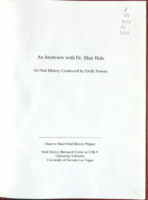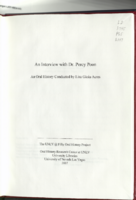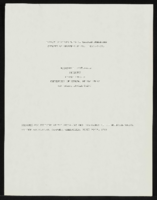Search the Special Collections and Archives Portal
Search Results
Gold Hill Nevada Masonic Lodge Records
Identifier
Abstract
The collection consists of three bound volumes and a small leather folder, documenting Masonic Lodge activity in Gold Hill, Nevada between 1866 and 1917. The volumes contain lodge meeting minutes from 1866 to 1872; lodge membership records from 1866 to 1872; and lodge financial records from 1866 to 1917.
Archival Collection
Clark County Child Care Association (CCCA) Records
Identifier
Abstract
The Clark County Child Care Association (CCCA) Records (1957-1975) contain correspondence, fliers, dues paid rosters, insurance information, bills, memberships cards, and receipts. Also included are miscellaneous dues-related documents, minutes of CCCA (Nevada) general membership and executive board meetings, and a newsletter.
Archival Collection
Dennis Gomes Professional Papers
Identifier
Abstract
This collection has been removed from the University of Nevada, Las Vegas Libraries Special Collections and Archives' holdings by order of the Nevada Gaming Control Board. The collection was returned to the Nevada Gaming Control Board. Please contact special.collections@unlv.edu for further information.
The collection was comprised of photocopies of materials documenting investigations undertaken from 1973 to 1977 by Dennis Gomes, in his role as Nevada Gaming Control Board Division Chief and Law Enforcement Officer. The collection included investigative material on organized crime skimming at the Stardust, the Tropicana, and other Nevada casino-hotels.
Archival Collection
Mary Lytle Papers
Identifier
Abstract
The Mary Lytle Papers date from 1909 to 1968 and document Lytle’s experience as the first midwife in Overton, Nevada. The collection contains medical certificates, professional correspondence with Nevada Assistant State Archivist Frederick C. Gale, a handwritten memoir, and black-and-white photographs.
Archival Collection

Transcript of interview with Blair Hale, by Emily Powers, June 16, 2006
Date
Archival Collection
Description
Text

Transcript of interview with Dr. Percy Poon by Lisa Gioia-Acres, February 5, 2007
Date
Archival Collection
Description
Text

"Impact of Stereotypes of Mexican Americans Created by Selected Films: 1920s-1960s" paper by Roosevelt Fitzgerald
Date
Archival Collection
Description
From the Roosevelt Fitzgerald Professional Papers (MS-01082) -- Unpublished manuscripts file. Presented at the Social Science Conference of the National Social Science Association, Newport Beach, California.
Text

Christian Giovanni oral history interview: transcript
Date
Archival Collection
Description
Oral history interview with Christian Giovanni conducted by Cecilia Winchell, Jerwin Tiu, and Stefani Evans on May 17, 2022 for the Reflections: the Las Vegas Asian American and Pacific Islander Oral History Project. In this interview, Giovanni describes her early life being born and raised in Las Vegas, Nevada. She discusses her mother, Oywan, who first worked for the casinos before turning her focus to community building. Throughout Oywan's life, she did everything from start the first temple in the city to the first Thai newspaper, Las Vegas News. Giovanni mentions having what she considers a normal childhood, especially because of her more Western appearance, and did not embrace her AAPI identity until much later in life after she started helping her mother with different organizations. Currently, Giovanni is involved in many organizations, from the AAPI County Commission to the Thai Culture Foundation.
Text

Jack Weinstein and Polly Weinstein interview, April 12, 2018: transcript
Date
Archival Collection
Description
Tower of Jewels is one of those iconic Las Vegas businesses that continues to thrive. At the time of this interview, Jack Weinstein is in his nineties and “retired.” With him is his daughter Polly Weinstein, who in addition to being involved in the business management has her own custom designed jewelry line, aptly named The Jeweler’s Daughter. As the youngest of six children born to Jewish Russian immigrants Joseph and Pauline (Polly is named for her grandmother), Jack was raised in a dangerous neighborhood of Detroit, Michigan. His youthful enterprise included collaborating and then splitting up with his brothers in a jewelry business, before eventually moving west to Los Angles in the early 1960s. On his own, Jack became a wholesale salesperson representing lines of watches to other businesses. Included in his list of clients was Al Sanford’s Tower of Jewels in Las Vegas. The two became friends and Al suggested setting up a partnership between Al’s son and Jack in 1964. Eventually
Text

Transcript of interview with Mindy Unger-Wadkins by Barbara Tabach, October 28, 2015
Date
Archival Collection
Description
In this interview, Unger-Wadkins discusses growing up in Las Vegas? close-knit Jewish community in the 1960s and 1970s, and involvement with various Jewish youth organizations and activities. She also describes her career in public relations, reflecting upon the unique challenges faced when interacting with the public, and with politics, in her positions. Unger-Wadkins ends by describing her current work in land development, particularly the history of the Three Kids Mine and the technical and political process of ensuring the land is suitable as a residential area.
Text
